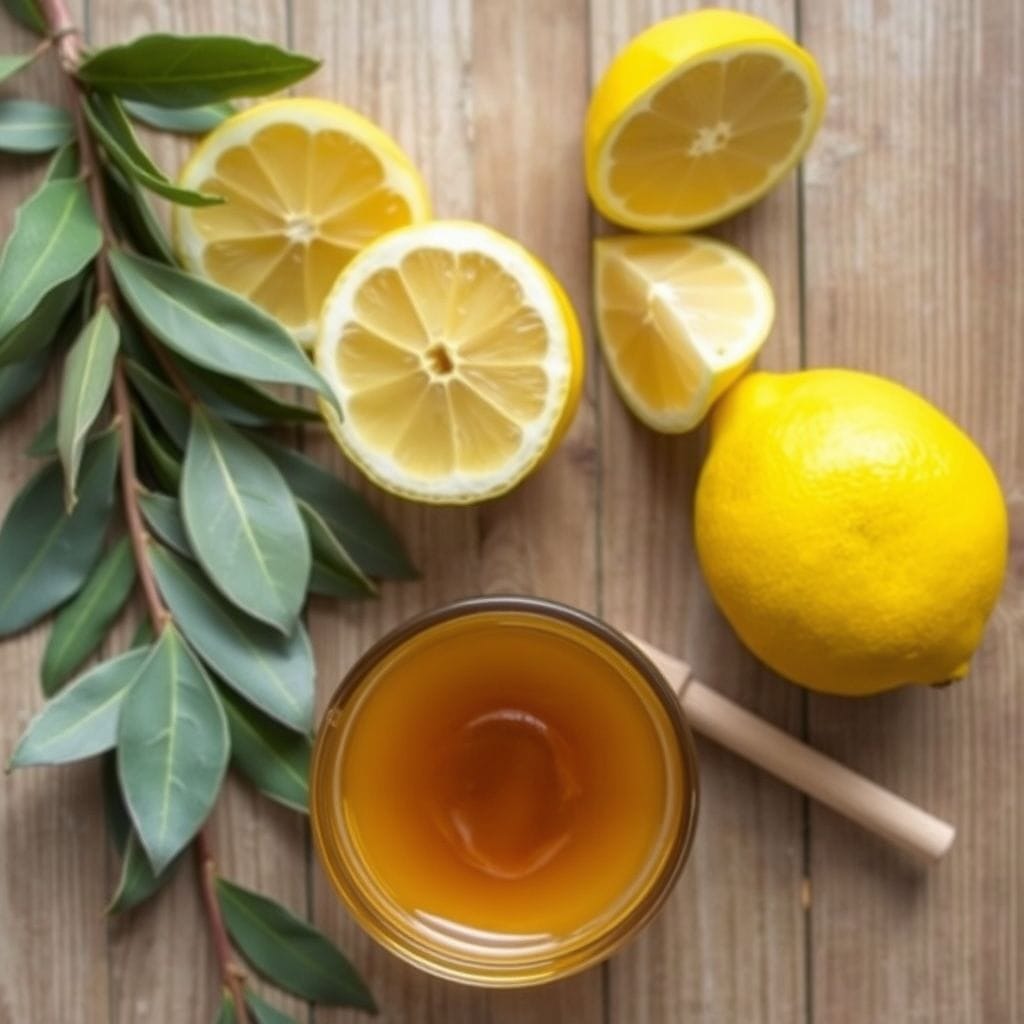Table of Contents
When cold and flu season strikes or a persistent cough disrupts your peace, finding gentle yet effective relief becomes top priority. Instead of reaching for store-bought syrups loaded with artificial colors and preservatives, why not turn to nature’s own medicine cabinet? Lemon and bay leaf cough syrup is a time-honored remedy that combines centuries-old wisdom with modern understanding of holistic health. This soothing concoction not only calms coughs, but also supports your lungs and immune function—all with familiar ingredients likely already in your kitchen.
Why Choose a Natural Remedy?
The resurgence of natural home remedies reflects both a trust in traditional practices and growing concerns over synthetic additives found in many OTC cough syrups. Homemade herbal syrups allow you to control every ingredient, ensuring purity and quality for your family.
- No unwanted chemicals: Just pure, whole food ingredients.
- Customizable: Adjust sweetness or flavor to suit your taste and needs.
- Cost-effective: Much less expensive than commercial syrups.
- Environmentally friendly: Less packaging waste.
“Let food be thy medicine and medicine be thy food.” — Hippocrates
The Science Behind Lemon and Bay Leaf
The pairing of lemon and bay leaves isn’t random—both offer unique medicinal properties that make this syrup a powerful ally during coughs and respiratory distress.
Bay Leaves: Aromatic Allies for Respiratory Comfort
- Anti-inflammatory: Bay leaves (Laurus nobilis) are rich in eucalyptol and other volatile compounds, which calm inflamed membranes in the respiratory tract.
- Decongestant: Their natural oils promote mucus clearance and open congested airways.
- Antimicrobial: Bay leaves contain phytochemicals known to help fight off pathogens responsible for upper respiratory infections.
- Calming aroma: The comforting scent of bay leaves alone can help relax the body and mind, aiding rest and recovery.
Lemon: Nature’s Immune-Booster
- Vitamin C powerhouse: Lemons offer a significant dose of ascorbic acid, which enhances the function of immune cells and helps the body resist infections.
- Throat soothing: The acidic nature of lemon juice can reduce inflammation and irritation in the throat, providing fast relief from discomfort.
- Mucus thinner: Lemons help thin and loosen mucus, making it easier to expel and thus clearing your airways.
The Role of Honey
While lemon and bay leaf shine as health heroes, honey is the crucial third component. This gentle sweetener not only improves taste but is itself a time-tested remedy for coughs.
- Natural cough suppressant: Studies show honey can be as effective as conventional cough medicine for soothing nighttime coughing and improving sleep.
- Antibacterial shield: Enzymes in honey produce hydrogen peroxide, providing a layer of protection against germs in the throat.
- Moisturizing: Honey coats and soothes dry, irritated mucous membranes, reducing throat tickle and pain.
How to Make Lemon & Bay Leaf Cough Syrup
Simple, Fresh, and Effective Recipe
The process of making homemade cough syrup is delightfully simple and fast. In just about half an hour, you can whip up a batch of this powerful elixir to have ready whenever coughs strike.
Tip: You can use fresh or dried bay leaves for this recipe. If using fresh, make sure they are clean and unblemished; if dried, ensure they’re fragrant and green (not brown and brittle).
Ingredients:
- 2 cups water (preferably filtered)
- 5 bay leaves (fresh or dried)
- Juice of 1 large lemon (about 3 tablespoons)
- 2-3 tablespoons raw, natural honey (or to taste)
Instructions:
- Boil water: In a small saucepan, bring 2 cups of water to a rolling boil.
- Infuse bay leaves: Add the bay leaves to the boiling water. Reduce the heat to a gentle simmer. Let it simmer, covered, for 10-15 minutes. This allows the beneficial oils and compounds to fully infuse the water.
- Strain: Remove from heat. Discard the bay leaves and pour the infused liquid through a fine mesh strainer into a heatproof bowl or jar.
- Add lemon and honey: Allow the hot liquid to cool until it’s warm (but not hot enough to destroy the honey’s benefits). Stir in the freshly squeezed lemon juice and honey. Mix thoroughly until the honey dissolves.
- Bottle: Pour your finished cough syrup into a clean glass jar with a tight-fitting lid. Label it with the date.
Storage: Store in the refrigerator for up to 3 days. Shake gently before each use, as natural separation may occur.

How to Use Your Homemade Cough Syrup
For optimal results, take 1–2 tablespoons of the syrup 2–3 times daily, especially first thing in the morning and before bed. This schedule helps calm coughing fits, clear mucus, and ensure restful sleep.
- Adults: 1–2 tablespoons per dose
- Children over 1 year: 1 teaspoon per dose (never give honey to children under 1 year due to the risk of botulism)
Troubleshooting: If the syrup tastes too tart, add a bit more honey. If too sweet, increase the lemon juice or add an extra bay leaf next time for a deeper herbal flavor.
Health Benefits of Lemon and Bay Leaf Syrup
Homemade remedies like this syrup are more than just folklore—they bring together the potent compounds of kitchen ingredients in a way that directly benefits your health. Here’s what you can expect:
- Relieves coughs: The soothing action of honey, anti-inflammatory bay leaf, and acidic lemon juice help calm spasms and reduce irritation.
- Clears congestion: Bay leaves and lemon work synergistically to thin, loosen, and expel mucus, making coughs more productive and less distressing.
- Boosts immunity: High vitamin C from lemon and antimicrobial action from both honey and bay leaves empower your body’s natural defenses.
- Eases breathing: Reduction of airway inflammation and expulsion of mucus restore comfortable, deep breathing.
- Provides comfort and relaxation: The gentle aroma of bay leaf helps soothe anxiety and promote relaxation, aiding restful sleep so vital for healing.
Deep Dive: Understanding the Ingredients
Bay Leaf: A Hidden Herbal Gem
Bay leaf is often thought of as “just a flavoring,” but herbal traditions from Greece to India have long prized it for its healing virtues. It’s rich in cineole (eucalyptol), which possesses both expectorant and anti-inflammatory effects, ideal for respiratory health.
- Traditional uses: Used in teas and infusions for coughs, bronchitis, and chest congestion.
- Modern science: Laboratory studies suggest bay leaf extracts can inhibit the growth of bacteria and viruses, and reduce oxidative stress in airway tissues (source).
Lemon: From Immune Shield to Throat Healer
Lemons aren’t just for flavor—their potent vitamin C content and unique phytonutrients make them an essential cold-fighting ally.
- Cleansing effect: Acidic lemon juice can cut through mucus and help your body flush out unwanted viral or bacterial invaders.
- Research-backed: Regular intake of vitamin C reduces severity and duration of respiratory infections (source).
Honey: The Golden Healer
Not just a food, but a true medicine: honey has documented antibiotic, antiviral, antioxidant, and soothing properties.
- Clinical validation: Studies in children have shown honey not only quiets coughs but also improves sleep more effectively than some brand-name cough syrups (source).
- Hormonal balance: The sweet comfort of honey may also help modulate stress hormones, which rise during illness.
Customizing Your Homemade Cough Syrup
One of the best things about making your own remedies is flexibility. Here are some creative ways to make your syrup even more effective—or just more suited to your taste:
- Add ginger: Grate a half-inch of fresh ginger and simmer with the bay leaves for a spicy immune boost.
- Try cinnamon: Add a stick of cinnamon to the pot for warmth and additional anti-inflammatory effects.
- Use different honeys: Manuka, wildflower, or buckwheat honey all carry unique flavors and health benefits.
- For kids: Double the honey for extra sweetness and a milder flavor profile.
- To reduce sugar: Use the minimum honey needed, and rely on lemon for brightness.

Frequently Asked Questions (FAQ)
How safe is homemade cough syrup?
When made with the right ingredients, homemade syrup is generally very safe. Always use pasteurized honey for children over age 1. If you have chronic health issues or take medication, consult your doctor before starting new herbal remedies.
Can I use dried bay leaves?
Yes! Dried bay leaves are convenient and often more accessible than fresh. Just ensure yours are still fragrant and not faded or dusty.
How long can I store this syrup?
Stored in a sterile, tightly sealed jar in the fridge, your syrup will stay potent for up to 3 days. Discard immediately if you notice any unusual odor or mold.
Can this syrup be used for children?
Yes—honey should never be given to children under 1 year. For those over 1, use 1 teaspoon per dose. Always supervise and start with a small amount to check for allergies.
Does it work for all types of cough?
This syrup is most effective for mild upper respiratory coughs related to dryness, colds, or allergies. For severe, persistent, or productive coughs, consult a healthcare provider.
Are there any side effects?
Side effects are rare but may include allergies to honey or citrus. Excessive syrup consumption may cause digestive upset due to the acidity and sugars.
Other Ways to Support Lung Health Naturally
- Steam inhalation: Pour boiling water into a large bowl, add bay leaves and a slice of lemon, and inhale the steam for 5 minutes. This opens airways and delivers beneficial compounds right where they’re needed.
- Herbal teas: Combine bay leaf with thyme, ginger, or licorice root for an all-day lung support tea.
- Stay hydrated: Water and warm herbal drinks promote thin, loose mucus.
- Rest: Your body needs extra sleep to fight off viruses and recover.
Summary: Breathe Easy With Nature’s Relief
The next time a tickly throat or congested cough threatens your comfort, reach for your kitchen staples—lemon and bay leaf—plus a spoonful of honey. With this natural syrup, you can nurture your airways, boost your immune system, and indulge in the gentle comfort only real food provides.
Remember: homemade remedies are most powerful when used at the first sign of symptoms, alongside rest, hydration, and a nourishing diet. As you sip, inhale, and savor this ancient blend, you’re participating in a global tradition of self-care and culinary medicine.
Experience The Comfort of Homemade Cough Relief
Every spoonful of this fragrant, nurturing syrup offers more than symptom relief—it’s a reminder that simple ingredients and mindful preparation remain among our most powerful tools for health. Next time cough season arrives, you’ll be ready with an all-natural elixir that soothes the throat, clears the lungs, and comforts body and soul.

